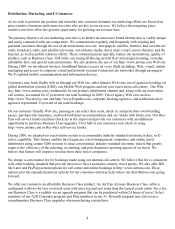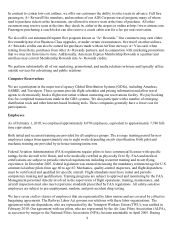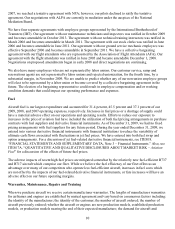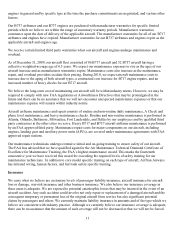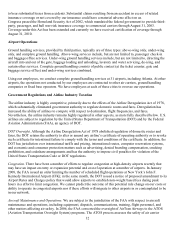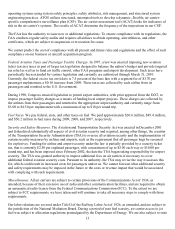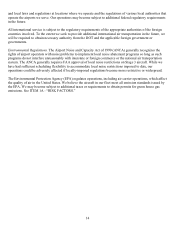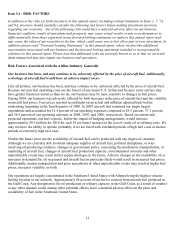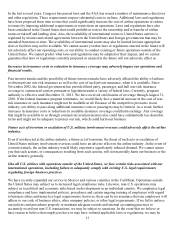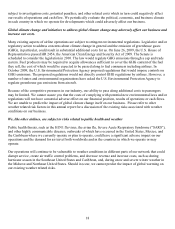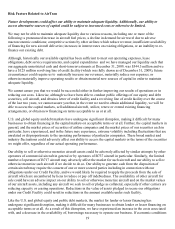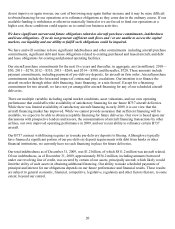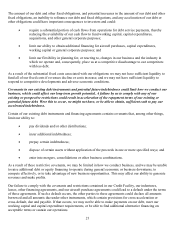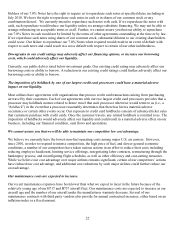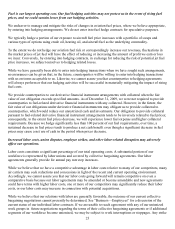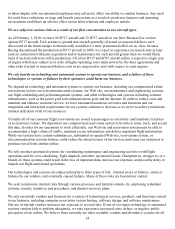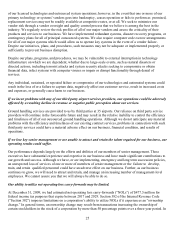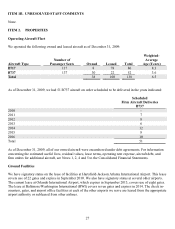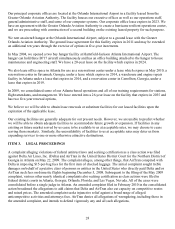Airtran 2009 Annual Report Download - page 27
Download and view the complete annual report
Please find page 27 of the 2009 Airtran annual report below. You can navigate through the pages in the report by either clicking on the pages listed below, or by using the keyword search tool below to find specific information within the annual report.18
subject to investigation costs, potential penalties, and other related costs which in turn could negatively affect
our results of operations and cash flow. We periodically evaluate the political, economic, and business climate
in each country in which we operate for developments which could adversely affect our business.
Global climate change and initiatives to address global climate change may adversely affect our business and
increase our costs.
Many existing aspects of airline operations are subject to stringent environmental regulations. Legislative and/or
regulatory action to address concerns about climate change in general and the emission of greenhouse gases
(GHG), in particular, could result in substantial additional costs for us. On June 26, 2009, the U.S. House of
Representatives passed HR 2454, the American Clean Energy and Security Act of 2009. The Senate is
scheduled to consider the legislation in 2010. The law would regulate GHG emissions through a cap and trade
system. Fuel producers may be required to acquire allowances sufficient to cover the GHG content of the fuel
they sell, the cost of which would be expected to be passed along to fuel consumers including airlines. In
October 2009, the U.S. Environmental Protection Agency proposed regulations that would impose controls on
GHG emissions. The proposed regulations would not directly control GHG regulations by airlines. However, a
number of states and environmental organizations have asked the U.S. Environmental Protection Agency to
regulate greenhouse gas emissions from aircraft.
Because of the competitive pressures in our industry, our ability to pass along additional costs to passengers
may be limited. We cannot assure you that the costs of complying with potential new environmental laws and/or
regulations will not have a material adverse effect on our financial position, results of operations or cash flows.
We are unable to predict the impact of global climate change itself on our business. Please refer to other
weather related risk factors in this annual report for a discussion of the existing risks associated with weather
conditions on our business.
We, like other airlines, are subject to risks related to public health and weather
Public health threats, such as the H1N1 flu virus, the avian flu, Severe Acute Respiratory Syndrome (“SARS”),
and other highly communicable diseases, outbreaks of which have occurred in the United States, Mexico, and
the Caribbean where we currently operate or plan to operate, could have a significant adverse impact on our
operations and the demand for air travel both worldwide and in the countries in which we operate or may
operate.
Our operations will continue to be vulnerable to weather conditions in different parts of our network that could
disrupt service, create air traffic control problems, and decrease revenue and increase costs, such as during
hurricane season in the Southeast United States and Caribbean, and, during snow and severe winter weather in
the Midwest and Northeast United States. Should it occur, we cannot predict the impact of global warming on
our existing weather related risks.


